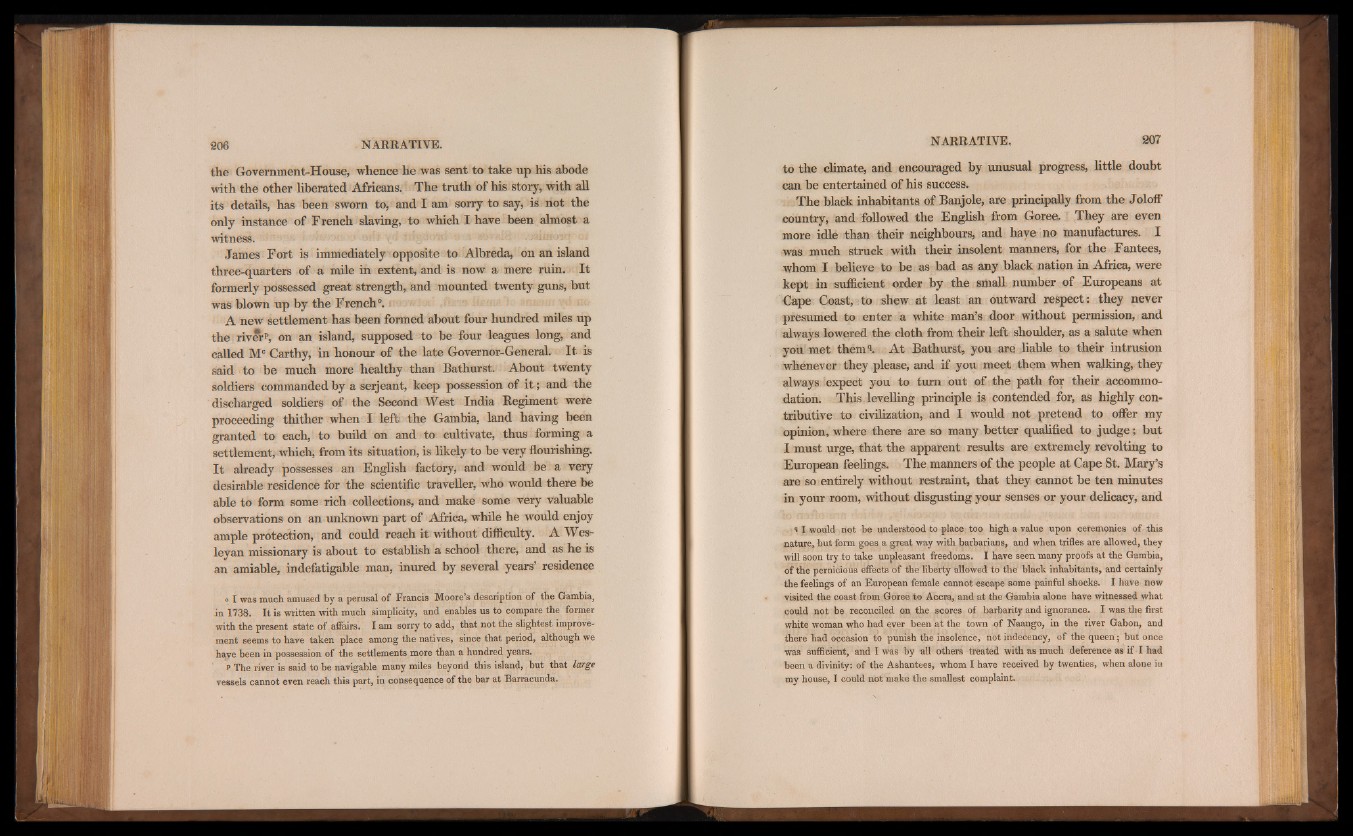
the Government-House, whence he was sent to take up his abode
with the other liberated Africans. The truth of his story, with all
its details, has been sworn to, and I am sorry to say, is not the
only instance of French slaving, to which I have been almost a
witness.
James Fort is immediately opposite to Albreda, on an island
three-quarters of a mile in extent, and is now a mere ruin. It
formerly possessed great strength, and mounted twenty guns, but
was blown up by the French".
A new settlement has been formed about four hundred miles up
the riv*rp, on an island, supposed to be four leagues long, and
called Mc Carthy, in honour of the late Governor-General. It is
said to be much more healthy than Bathurst. About twenty
soldiers commanded by a seijeant, keep possession of it ; and the
discharged soldiers of the Second West India Regiment were
proceeding thither when I left the Gambia, land having been
granted to each, to build on and to cultivate, thus forming a
settlement, which, from its situation, is likely to be very flourishing.
It already possesses an English factory, and would be a very
desirable residence for the scientific traveller, who would there be
able to form some rich collections, and make some very valuable
observations on an unknown part of Africa, while he would enjoy
ample protection, and could reach it without difficulty. A Wesleyan
missionary is about to establish a school there, and as he is
an amiable, indefatigable man, inured by several years’ residence
o I was much amused by a perusal of Francis Moore’s description of the Gambia,
in 1738. It is written with much simplicity, and enables us to compare the former
with the present state of affairs. I am sorry to add, that not the slightest improvement
seems to have taken place among the natives, since that period, although we
have been in possession of the settlements more than a hundred years.
p The river is said to be navigable many miles beyond this island, but that large
vessels cannot even reach this part, in consequence of the bar at Barracunda.
to the climate, and encouraged by unusual progress, little doubt
can be entertained of his success.
The black inhabitants of Banjole, are principally from the Joloff
country, and followed the English from Goree. They are even
more idle than their neighbours, and have no manufactures. I
was much struck with their insolent manners, for the Fantees,
whom I believe to be as bad as any black nation in Africa, were
kept in sufficient order by the small number of Europeans at
Gape Coast, to shew at least an outward respect: they never
presumed to enter a white man’s door without permission, and
always lowered the cloth from their left shoulder, as a salute when
you met them & A t Bathurst, you are liable to their intrusion
whenever they please, and if you meet them when walking, they
always expect you to turn out of the path for their accommodation.
This levelling principle is contended for, as highly con-
tributive to civilization, and I would not pretend to offer my
opinion, where there are so many better qualified to judge; but
I must urge, that the apparent results are extremely revolting to
European feelings. The manners of the people at Cape St. Mary’s
are so entirely without restraint, that they cannot be ten minutes
in your room, without disgusting your senses or your delicacy, and
1 1 would not be understood to place ; too high a value upon ceremonies of this
nature, but form goes, a great way with barbarians, and when trifles are allowed, they
will soon try to take unpleasant freedoms. I have seen many proofs at the Gambia,
of the pernicious effects of the liberty allowed to the black inhabitants, and certainly
the feelings of an European female cannot escape some painful shocks. I have now
visited the coast from Goree to Accra, and at the Gambia alone have witnessed what
could not be reconciled on the scores of barbarity and ignorance. I was the first
white woman who had ever been at the town -of Naango, in the river Gabon, and
there had occasion to punish the insolence, not indecency, of the queen ; but once
was sufficient, and I was by all others treated with as much deference as if I had
been a divinity: of the Ashantees, whom I have received by twenties, when alone in
my house, I could not make the smallest complaint.